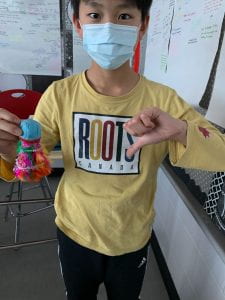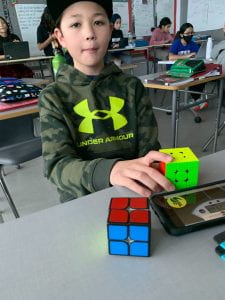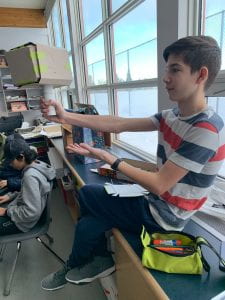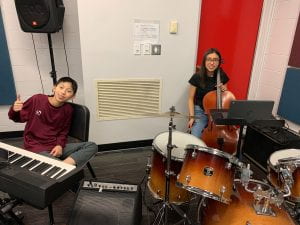It’s fantastic to see the works in progress.







It’s fantastic to see the works in progress.






With Genius Hour, there’s no curriculum for me to measure you against. There’s no quiz or test I can give you to check if you’ve learned what you set out to. Instead, you have to demonstrate your learning with your weekly blog post. There are two key elements I’d like you to cover: evidence of learning and reflection on learning.
Evidence
Give me some proof that you’ve been working. That evidence might take the form of photos or video. That evidence might be a copy of the email you sent to an expert. It might be a description of a conversation you had with an expert. Don’t be afraid to showcase your first attempts and your failures; they’ll help to make it obvious that you’ve learned and improved by the end.
Reflection
Think about what you’ve learned. Here are some possible sentence stems to include in your weekly post:
In your blog post today, please share your plan. Some things to include:
After a few years away from teaching the Gifted and Talented grade 8 class, I’m happy to have the chance to facilitate Genius Hour again!
Students will complete two Genius Hour projects this year, presenting the first in late February and the second mid June.
Genius Hour is a ‘learn to do’ project rather than a ‘learn about’ project. Students choose their topic, determine what they will learn, decide how they can demonstrate their learning, and plan the steps necessary to get there. Every Wednesday morning students will have a period to work on their project.
Students have the choice of working with a partner on one of the two projects or working solo on both. Regardless of whether or not they have a partner, each student will blog weekly to demonstrate their progress and reflect on their learning. Positive comments and questions are welcome.
After students present their learning, they’ll negotiate with me for their grade. Our decision will be based on use of class time, quality of blogging, evidence of learning, and quality of presentation. Some may not achieve their goals. That’s okay if their blogs demonstrate their efforts and their adaptations to their plans.
Here are some things to think about when you’re coming up with a percentage with which to open negotiations:
Here are the questions I want you to consider as you plan for your Term 2 Genius Hour project. Answer them with a blog post of your own:
Thanks to Silvia Rosenthal Tolisano for the KWHLAQ chart idea.
I have two teen-aged children of my own and they’ve been grumbling because their teachers don’t do genius hour. I told them they didn’t need a class, just an hour of their own each week. My eldest decided we should have family genius hour.
My project will be baking breads from scratch. I know a little bit about it. I have a bread maker and sometimes use it to make the dough and finish the loaf or buns by hand. I’ve also made cinnamon buns using my grandmother’s scratch recipe, but I’d like to really explore bread baking.
Today I started by reading a couple of articles about how to bake bread from scratch. I decided to start with a French style loaf since that suits tonight’s supper well.
I was surprised to learn how much kneading is required – 10 to 13 minutes if you do it by hand! That’s a pretty good workout!
Kneaded and ready for rising
I incorporated a couple of tips that were new to me: I warmed my bowl before mixing the dough by pouring hot water in; and I covered the dough with plastic wrap for warming. In the past I’ve used a tea towel, but I have had the dough stick to it a couple of times.

Punched

A little uneven, but ready for the oven
I tried the steam feature on my oven as I read that improves the crust.

Oops, cooked a little more quickly than expected. I think I’ll drop the temperature next time.
I’ll do a few things differently next time. I’ll knead directly on the clean counter top like the recipe suggested. My rolling mat just kept sliding around, annoying me, while I kneaded. I’ll also do some research on kneading techniques since my dough didn’t past the kneading test even after 14 minutes of kneading.

Supper – my bread and the leftover ratatouille I made for my Grade 8 French class
My first read aloud this year was Patricia MacLachlan’s Edward’s Eyes. I was reading it for the first time as I read it aloud to my students. I knew from reading reviews that the title character dies (oops, maybe I should have prefaced that with a spoiler alert!), but I assumed he died early on. Instead the author made us love Edward, and then killed him. I had to read aloud, forcing the words around the lump in my throat and sniveling. I did only slightly better when I read it to my second class.
As I read aloud Chapter 7 of Orbiting Jupiter this week, I had a similar sensation. I have not read ahead, but I’ve heard enough to make me fear that the story ends tragically. There was such a strong feeling of foreboding in the pages of this chapter. I was at least as close to tears as the librarian/foster mom. Maybe I was even as teary as Jack. There was so much tension in the scene with the police officers; though I must say I’m glad Schmidt didn’t portray them as bad guys. I was honestly surprised that the chapter ended as positively as it did for Joseph.
Still my worry remains, there’s the loose end of Joseph’s father, there’s Nick Porter and his friends, and there was a hint that Mrs. Stroud might be thinking about moving Joseph. How will it end? You can bet I’ll be reading that last chapter aloud first thing Monday morning.

Mini cliff hangers? This book’s got them. There was nearly a mutiny when I closed the book after Chapter 3, after the words “Joseph told us everything. Everything.”
Emotional impact? Orbiting Jupiter‘s got that too. Rarely is a classroom as quiet as it was today when we read Chapter 4. There was a quality to that silence – focused, filled with curiosity and then dread.
What’s next? We think more trouble’s coming, from the eighth grade boys, from Mr. Canton, maybe from Joseph’s dad. It’s hard not to read ahead!